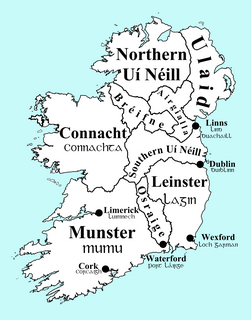Connad Cerr (Connad the Left-handed) was a king of Dál Riata in the early 7th century. He was either a son of Conall mac Comgaill or of Eochaid Buide. Connad appears to have been joint king with Eochaid Buide in the 620s.

Dál Riata or Dál Riada was a Gaelic overkingdom that included parts of western Scotland and northeastern Ireland, on each side of the North Channel. At its height in the late 6th and early 7th centuries, it encompassed roughly what is now Argyll in Scotland and part of County Antrim in the Irish province of Ulster.
Conall mac Comgaill was king of Dál Riata from about 558 until 574.
Eochaid Buide was king of Dál Riata from around 608 until 629. "Buide" refers to the colour yellow, as in the colour of his hair.
He is named as king of Dál Riata in 627 when he won a victory over Fiachnae mac Demmáin, king of the Ulaid at Ard Corann. Connad was killed at Fid Eóin, fighting against the Dál nAraidi led by Máel Caích, brother of Congal Cáech. While the Annals of Ulster have the battle in 629 and the Annals of Tigernach in 630, both place the death of Connad before the death of Eochaid Buide.
Fiachnae mac Demmáin was King of Ulaid from 626 to 627. Sometimes called Fiachnae Dubtuinne. He was a member of the Dal Fiatach and nephew of Baetan mac Cairill of Ulaid. He was the son of Demmán mac Cairell. He succeeded his uncle as king of the Dal Fiatach in 581.

Ulaid or Ulaidh ) was a Gaelic over-kingdom in north-eastern Ireland during the Middle Ages, made up of a confederation of dynastic groups. Alternative names include Ulidia, which is the Latin form of Ulaid, as well as in Cóiced, which in Irish means "the Fifth". The king of Ulaid was called the rí Ulad or rí in Chóicid.
The Battle of Fid Eoin was fought in early medieval Ireland between the kingdoms of Dál Riata and Dál nAraidi in either 629 or 630. The forces of Dál Riata were led by their king Connad Cerr, whilst the Dál nAraidi were led by Máel Caích, brother of Congal Cáech who was the king of the Dál nAraidi and the over-kingdom of Ulaid. The result of the battle was a decisive defeat of the Dál Riata.
Connad's son Ferchar was later king. An entry in the Book of Ballymote associates Connad's descendants with "the men of Fife".
Ferchar mac Connaid was king of Dál Riata from about 642 until 650.

The Book of Ballymote, was written in 1390 or 1391 in or near the town of Ballymote, now in County Sligo, but then in the tuath of Corann.

Fife is a council area and historic county of Scotland. It is situated between the Firth of Tay and the Firth of Forth, with inland boundaries to Perth and Kinross and Clackmannanshire. By custom it is widely held to have been one of the major Pictish kingdoms, known as Fib, and is still commonly known as the Kingdom of Fife within Scotland. Fife is one of the six local authorities part of the Edinburgh and South East Scotland city region.
